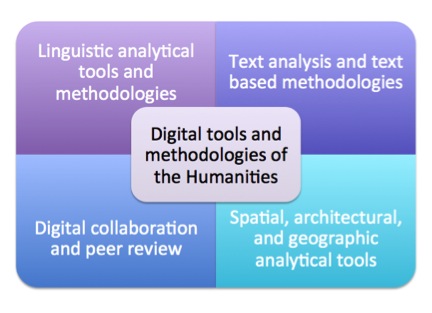Is there a post digital humanities?
By David Phillips
Initial exploration of the realm of digital humanities, or what some of my colleagues and I have started calling the intersection of the digital and the humanities, leaves me wondering just how useful the quasi-disciplinary rubric of digital humanities actually is. Our inventory of the term’s uses includes and sub-fields (if a sub-field of a sub-field is actually an intelligible category), linguistic concordance and analysis, spatial humanities, text mark-up, new approaches to online collaboration and digital scholarship and digital pedagogy, the use of digital archival tools, and forms of analysis that rely heavily on digital technologies.
Can we really call such a breadth of investigatory domains a bound discipline or sub-discipline of knowledge? Is this just a tidy misnomer for a very broad range of tools, approaches, and techniques of analysis that all share their place within the humanities and their location within the digital realm? Are the scholars and technologists who are the early adapters of the term ‘digital humanities’ stakeholders who would like their work to be collectively recognized as a definable field of knowledge, even though they can’t agree whether digital humanities refers to the tools that distinguish the field or the methodologies and pedagogies that utilize these tools?
I would like to suggest that the short gestation period we have witnessed for digital humanities is over. If we recognize that the current umbrella metaphor for these widely diverse sets of knowledge is too amorphous to be that useful, it is time to move on to a descriptive term that more accurately reflects the diversity and breadth of semantic range of the term. Were I to be following in the footsteps of recent trends in scholarship, in an era of post-disciplinarity and discussion among ecocritics of the post-human, perhaps the term ‘post-digital humanities’ would be appropriate. But such a label would just cloud the already obscured view of what the digital humanities are and what they do.
I would rather just call the tools ‘digital tools,’ recognizing the fact that they are not exclusive to the humanities. As for the methodologies, some belong to the humanities and others belong to all scholarship. Is digital collaboration exclusively in the realm of the humanities? Are digitally generated and investigated spatial studies that relate to humanities purely within the domain of the humanities? In both cases I would argue that a claim of exclusivity of these tools to the humanities is elusive.
What would our new typology for the post-digital humanities look like? Perhaps it would look something like this:
Based on the above diagram, we might find it easier to conclude that digital humanities isn’t a discipline at all. Instead, we could conceive of it as a set of tools and humanities-based approaches that humanists who work in the digital realm like to use. It isn’t really post-anything. Rather, we can think of it as a a digital expansion and colonization of our explorations of the humanities. If the term colonization stings, perhaps it is time to disassociate from the colonizers and reject the term ‘digital humanities’ altogether!
Our goal
The DH Community is a program of Wake Forest's Humanities Institute. We are faculty from across campus interested in investigating the emergence of digital humanities as a field of study, and its relevance and usefulness as a research and teaching tool in the humanities.Join the conversation!
Use your Wake Forest username and password to login and contribute to DH Talk.
Tag Cloud
administration advocacy alan liu Alan Turing Artificial Intelligence big data careers close reading cloud database design definitions DH2014 digital curation digital pedagogy digital projects digital scholarship digitization distant reading funding hastac history internet language liberal arts manuscripts maps media collections methods multimedia multimodal net neutrality organization pedagogy peer review quantitative analysis resource science Stanford DH statistics symposium teaching textual analysis THATCamp transcription word frequency


